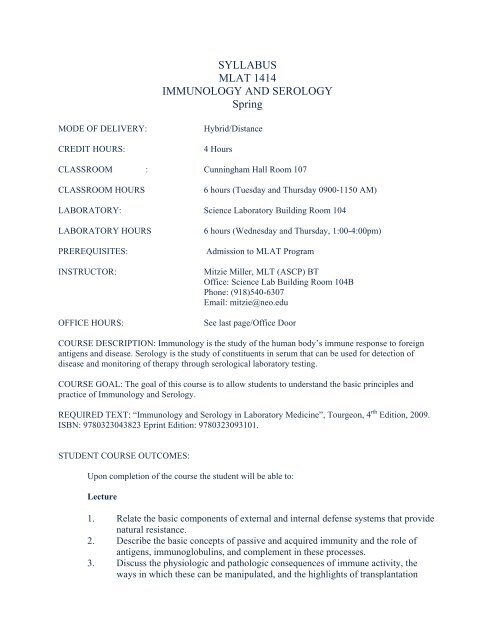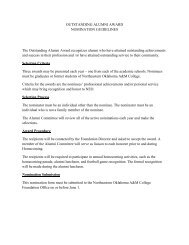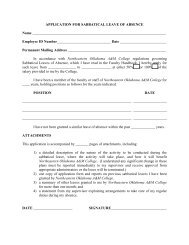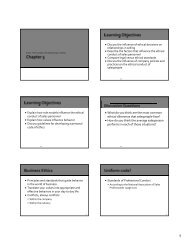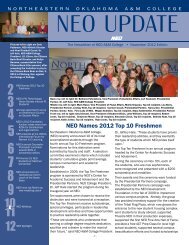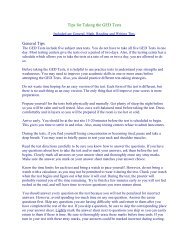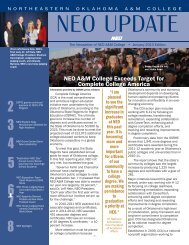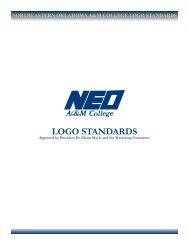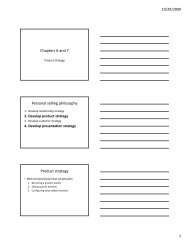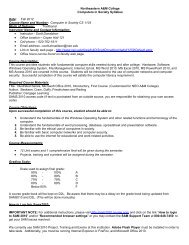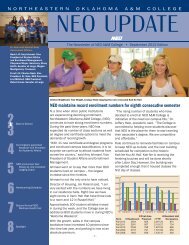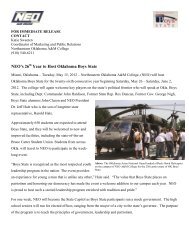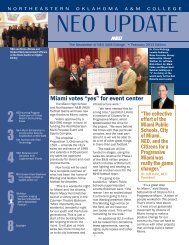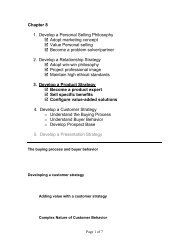SYLLABUS MLAT 1414 IMMUNOLOGY AND SEROLOGY Spring
SYLLABUS MLAT 1414 IMMUNOLOGY AND SEROLOGY Spring
SYLLABUS MLAT 1414 IMMUNOLOGY AND SEROLOGY Spring
You also want an ePaper? Increase the reach of your titles
YUMPU automatically turns print PDFs into web optimized ePapers that Google loves.
<strong>SYLLABUS</strong><strong>MLAT</strong> <strong>1414</strong><strong>IMMUNOLOGY</strong> <strong>AND</strong> <strong>SEROLOGY</strong><strong>Spring</strong>MODE OF DELIVERY:CREDIT HOURS:Hybrid/Distance4 HoursCLASSROOM : Cunningham Hall Room 107CLASSROOM HOURS6 hours (Tuesday and Thursday 0900-1150 AM)LABORATORY: Science Laboratory Building Room 104LABORATORY HOURSPREREQUISITES:INSTRUCTOR:OFFICE HOURS:6 hours (Wednesday and Thursday, 1:00-4:00pm)Admission to <strong>MLAT</strong> ProgramMitzie Miller, MLT (ASCP) BTOffice: Science Lab Building Room 104BPhone: (918)540-6307Email: mitzie@neo.eduSee last page/Office DoorCOURSE DESCRIPTION: Immunology is the study of the human body’s immune response to foreignantigens and disease. Serology is the study of constituents in serum that can be used for detection ofdisease and monitoring of therapy through serological laboratory testing.COURSE GOAL: The goal of this course is to allow students to understand the basic principles andpractice of Immunology and Serology.REQUIRED TEXT: “Immunology and Serology in Laboratory Medicine”, Tourgeon, 4 rth Edition, 2009.ISBN: 9780323043823 Eprint Edition: 9780323093101.STUDENT COURSE OUTCOMES:Upon completion of the course the student will be able to:Lecture1. Relate the basic components of external and internal defense systems that providenatural resistance.2. Describe the basic concepts of passive and acquired immunity and the role ofantigens, immunoglobulins, and complement in these processes.3. Discuss the physiologic and pathologic consequences of immune activity, theways in which these can be manipulated, and the highlights of transplantation
immunology.4. Summarize immunodeficiency conditions, neoplasms of the immune system anddiseases of immune etiology.5. Relate and interpret tests that exploit different immunologic principles.6. State the relative advantages and disadvantages the tests provide for laboratoryanalysis.Laboratory1. Demonstrate the following skills as pertaining to each individual test.A. Relate the proper specimen collection and handling techniques.B. Perform acceptable quality control measuresC. State if results are within reference rangeD. State principle of analysis of method availableE. State sources of error and methods to minimize or eliminate these errors.2. Assemble and prepare appropriate materials and equipment for the performance of test procedures.3. Perform tests for disease detection with 100% accuracy using defined laboratory procedures.4. Correctly interpret test results.5. Correctly report test results.TEACHING & LEARNINGMETHODS:LectureLabsReading AssignmentsClass ExercisesHandoutsComputer Assisted ProgramsDiscussion QuestionsASSESSMENT METHOD:*Quizzes may be unannounced.3 Lecture Tests 300Case Studies 90Discussion Questions (Blog) 90Power Point Presentation 25Quizzes 7514 Lab Evaluations 70TOTAL650 pointsTo satisfactorily complete the course a student must achieve a 75% in the course to continue in theMLT program.
GRADING SCALE: Percent of the total possible pointsA 90%- 100%B 83% - 89%C 75% - 82%D 69% - 75%F
Rubric for Grading Student Labs1 Points .5 Point 0 Points1 Cooperates fully withinstructor and other studentsAssists other students2 Shows a good knowledge oflab tasks to be performed:performs setup, preparesand organizes materialswithout assistance frominstructor3 Accurately follows andperforms written procedureexactly as written4 Produces expected accurateresults – 100% of expectedvalue5 Correctly identifies and lists75% of possible sources oferror in lab tasksShows a moderate amount ofcooperation with instructor andother studentsShows a moderate amount ofknowledge of lab tasks:principle, materials, andprocedure – requires someassistance for setup, preparationand organization of materialsModerately follows andperforms written procedurewith minimal errorsProduces moderately accurateresults but less than expectedvalueIdentifies and lists more than50% of possible sources oferror in lab tasksShows little or no cooperationwith instructor and/or otherstudentsShows little or no knowledge oflab tasks: principle, materials,and procedure –requires fullassistance from instructor toperform setup, preparation andorganization of materialsDoes not accurately follow andperform written procedureDoes not produce expected oraccurate resultsCannot correctly identify and listmore than 50% of possiblesources of error in lab tasksRubric for Writing AssignmentsFollows Instruction for syle1 pointShows a good understanding testprinciple.1 pointIncludes all required elements1 pointCorrect spelling and grammar1pointIncludes proper reference1 pointModerately follows styleinstructions.50 pointShows a moderate amount ofunderstanding of the testprinciple.50 pointIncludes some of the requiredelements.50 pointUses partial proper spelling andgrammar.50 pointIncludes improper reference style.50 pointDoes not follow style instructions0 pointShows little or no understandingof test principle0 pointDoes not follow the requiredelements0 pointDoes not use proper spelling orgrammar0 pointDoes not include reference0 point4
Studiously prepares threelearning objectives forlesson instruction5 pointsSkillfully and clearlypresents lesson material ina comprehensive manner:theory, procedure,expected results,interference5 pointsCompetently observesstudents performing thelesson test answering allquestions5 pointsProficiently evaluatesstudent performance:grading, documenting, andoffering exceptionalfeedback5 pointsRubric for Student Instructional SessionPrepares two learning Prepares one learningobjectives for learning objective for learninginstructioninstruction3 points1 pointsPresents most lessonmaterial in acomprehensive manner:theory, procedure,expected results,interference3 pointsCompetently observesstudent performance andanswers most questions3 pointsAdequately evaluatesstudent performance:grading, documenting, andoffering good feedback3 pointsPresents some lessonmaterial in acomprehensive manner:procedure, expectedresults, interference1 pointsSomewhat competentlyobserves studentperformance and answerssome questions1 pointsInadequately evaluatesstudent performance:grading, documenting, andoffering some feedback1 pointsPrepares no learningobjectives for lessoninstruction0 pointsDoes not present lessonmaterial in acomprehensive manner:procedure, expectedresults, interference0 pointsDoes not competentlyobserve student testperformance and answersno questions0 pointsDoes not evaluate studentperformance: grading,documenting, and offeringno feedback0 pointsInstructor may elect to include field trips, class projects, college activities, and other assignments aspart of the MLT classroom and laboratory sessions.Additional Readings:You will be required to read and understand scientific manual instructions.Recommended Resources:World Wide Web: medtraining.orgMedical Laboratory Observer, Laboratory Medicine, and Vital Signs will be posted in the classroomFor help with pronunciation use this website: http://howjsay.com by typing in the word you want to hear.NEO D2L site which you will need a gold key to enter. To obtain this key call the help-desk in the ITCdepartment 918-542-8441 ask for ITC help desk.The NEO Library will have additional reading materials along with videos that will enhance your learningexperience.Class Handouts:If you miss class these handouts will be available in MLT Program office SLB 104B at 200 I NE Miami,OK, or may be posted on the D2L website.5
Course PoliciesIt is your responsibility to stay current on your grade. This course is not curved. No opportunity toimprove your grade will be given.If you must miss an examination you must contact me before the exam or as soon as possible, only byphone (email is not acceptable). You will be given one opportunity to take an alternate exam. If you failto call you will not be allowed to take the exam and your grade will be recorded as 0. No feedback onanswers or grades will be given to any student until all have taken the exam.Students are expected to conform to the professional standards and ethics of NEO A&M College as statedin the catalog, and in the MLT handbook. Unprofessional conduct may result in a written warning andprobation or a failing grade and immediate dismissal from the course, depending upon the severity of theinfraction,In case of inclement weather, check D2L for announcements and instructions. If possible, phone calls willbe made to each student to confirm class has been cancelled.EXAMINATIONS:All tests, quizzes and labs are to be taken at the assigned time. Quizzes and labs cannot be made up unlessan official notification is received from the Vice President of Academic Affairs.Examinations will be based on published chapter objectives. These may be modified during the course, atthe discretion of the instructor. You may have a blank piece of paper, calculator and a pen or pencil asyou take the test. All phones must be left in an off position during the test, and they must be stowedduring this time.ATTENDANCE:Attendance in class is imperative to facilitate understanding of the complex concepts presented in thecourse. A conference between student and instructor will be held if the student misses 3 lecture sessionsand the student will be placed on academic probation. Further absences during the semester will result indismissal from the MLT Program.Only absences which have an official notification received from the Vice President of Academic Affairsare considered excused absences. Regular attendance in class is important for success in the Immunogyand Serology course. A record of attendance will be kept. Any student with an excessive number ofabsences (>3) will be issued an Academic Warning and Probation.COURSE LABORATORY SESSIONS:Each lab session is worth ten points. Missed labs will result in awarding of zero (0) points. Missed labscannot be made up. Leaving a laboratory session early or without completing the assigned tasks willresult in a grade of zero (0) for that lab.Each student will be expected to participate fully and cooperatively in class projects and exercises and6
laboratory sessions. Points will be deducted from the student’s lab grade for lack of cooperation orparticipation in the performance of laboratory projects.DECORUM:Actions that disrupt the educational process will not be tolerated and continual disruption after a writtenwarning will result in a failing grade and dismissal from the course.CHEATING:Personal integrity is essential to the Medical Laboratory Technician profession. Cheating will not betolerated whether it is on an exam or quiz or a lab assignment. A student who is caught cheating will bedismissed from the course and receive a failing grade.Attendance in class is imperative to facilitate understanding of the complex concepts presented in thecourse. A conference between student and instructor will be held if the student misses 3 lecture sessionsand the student will be placed on academic probation. Further absences during the semester will result indismissal from the MLT Program.Americans with Disabilities Act (ADA) Policy StatementThe Americans with Disabilities Act (ADA) is a federal anti-discrimination statute that providescomprehensive civil rights protection for persons with disabilities. Among other things, this legislationrequires that all students with disabilities be guaranteed a learning environment that provides forreasonable accommodation of their disabilities. If you believe you have a disability requiring anaccommodation, please contact the ADA Coordinator at 918-540-6236.Communications:In case of an emergency that requires your absence you must contact me by phone or email.In the classroom all phones must be kept on silent. You may, in an emergency situation step into thehallway to take a call however; as this is a distraction it will only be permitted in emergency cases.Student phone calls will not be accepted evenings or weekends.Emails will be answered at the instructor’s discretion. You may expect the instructor to respond within24 hours of receiving (not sending), your email. Weekend email responses may be delayed until Monday.Instructor office hours have been posted outside office doors. Please use these hours for detailedinstruction, explanation, and to address problems. It is better to meet face to face when explainingdifficult concepts.7
Office Hours:Monday Tuesday Wednesday Thursday Friday7:008:009:00 Office Lecture Office Lecture Office10:00 Office Lecture Office Lecture Office11:00 Office Lecture Office Lecture Office12:001:00 Lab Lecture Lab Lecture2:00 Lab Lab3:00 Lab Office Lab Office4:005:008
My signature certifies that I have received the 2013 course syllabus for <strong>MLAT</strong> <strong>1414</strong> Immunology andSerology. I have received the above explanation of the grading system and I understand how my gradeswill be calculated.________Student Signature/Date________________________________Student Signature/Date____Student Signature/Date____Student Signature/Date________Student Signature/Date________Student Signature/Date________________________Student Signature/Date____Student Signature/Date________________Student Signature/Date________Student Signature/Date____________________________________________Student Signature/Date____Student Signature/Date____Student Signature/Date____Student Signature/Date____Student Signature/Date____________________________________Instructor Signature/Date9


